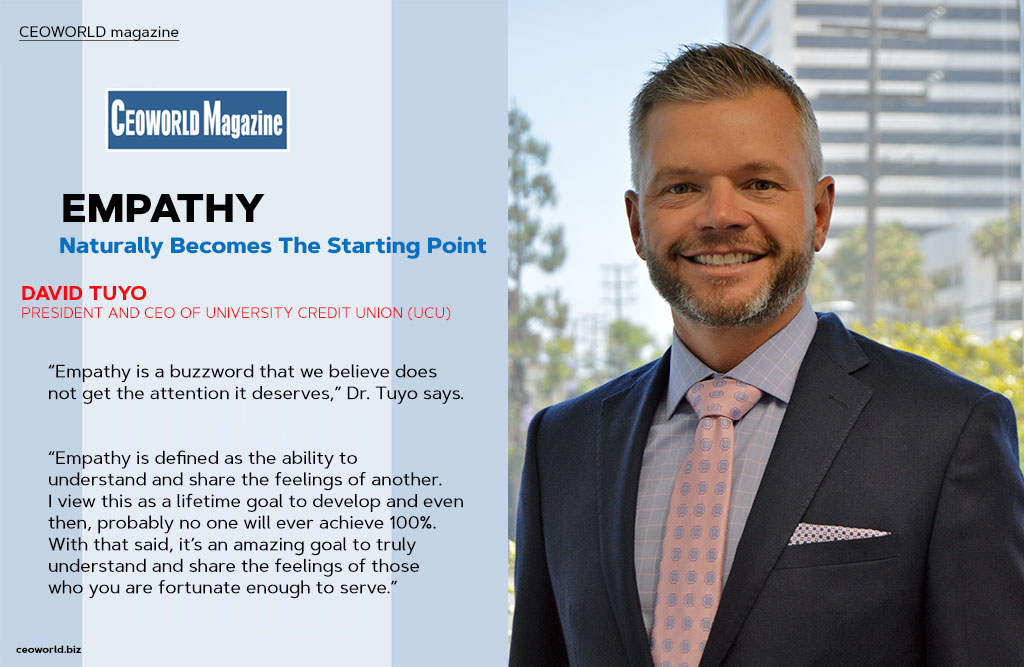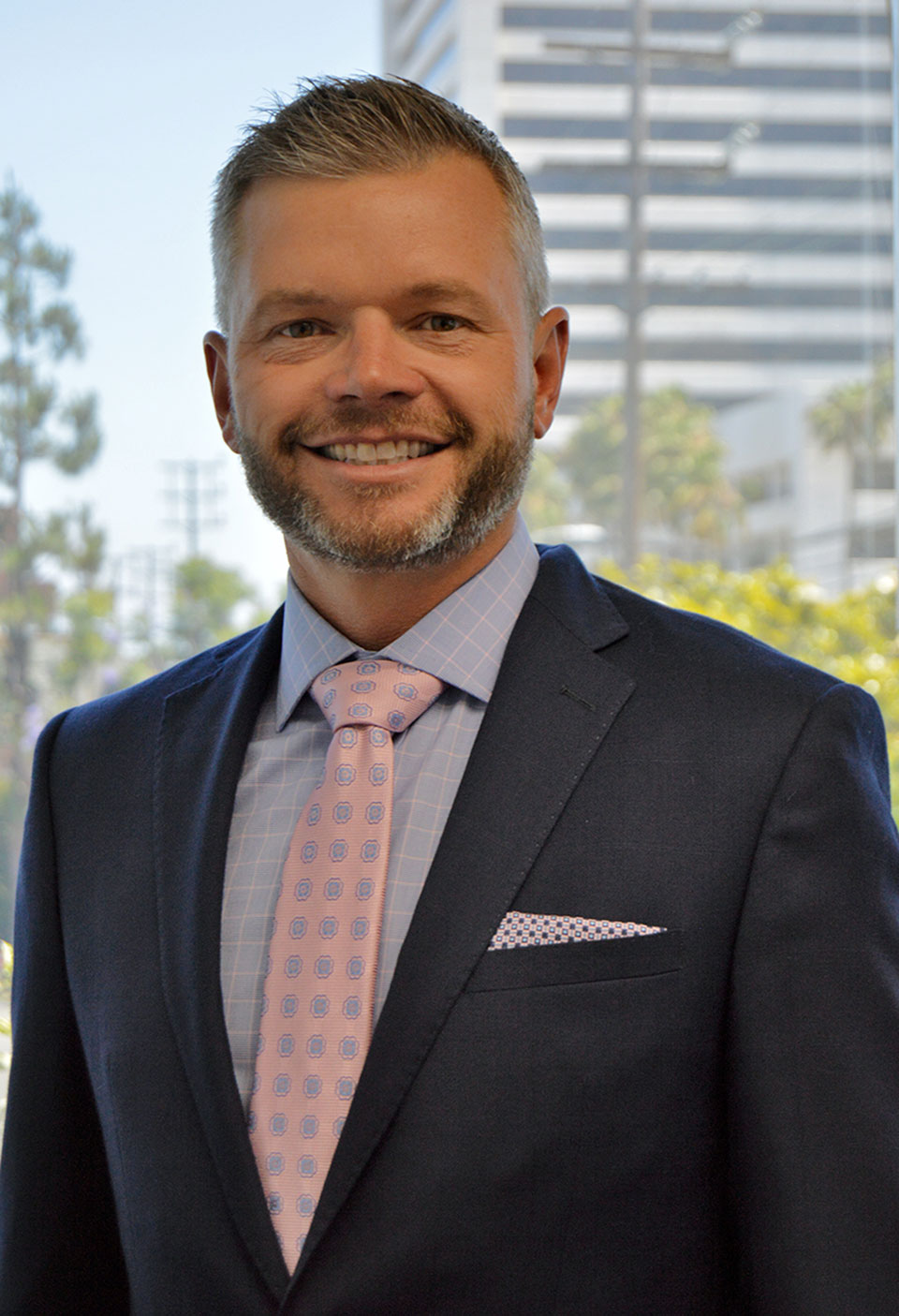Start With Empathy: A Guide To Better Leadership

What makes a good leader? What inspires someone to take action? What makes some organizations thrive while others struggle?
There are many fundamental questions that drive the philosophy of leadership, but there is one underlying characteristic that appears to be common among many great leaders: Empathy.
The ability to understand and share the feelings of others is a core component of successful leadership. It’s not enough to tell people what to do. Team members must be inspired and motivated in order to achieve greatness.
Leaders need to perceive the inward magnetic essence of individuals if they want to set a cardinal direction that their team is compelled to follow against all odds.
We spoke with Dr. David L Tuyo II, DBA, MBA, who serves as the President and CEO of University Credit Union (UCU) to find out more about his unique set of leadership skills and how empathy acts as one of his core principles in leadership.
He is a veteran of the financial services sector and an industry-recognized leader with accolades such as National Association of Federally-Insured Credit Unions’ Professional of the Year and the first ever recipient of the Award for Innovation from PSCU, the largest credit union service organization in the US.
“Empathy Naturally Becomes The Starting Point”
Dr. Tuyo shares that empathy is a starting point, but it takes a constant effort to fully understand its meaning and to implement it into your organizational structure.
“Empathy is a buzzword that we believe does not get the attention it deserves,” Dr. Tuyo says.
“Empathy is defined as the ability to understand and share the feelings of another. I view this as a lifetime goal to develop and even then, probably no one will ever achieve 100%. With that said, it’s an amazing goal to truly understand and share the feelings of those who you are fortunate enough to serve.”
“When you are operating with a high level of care for your team, as we do at UCU, empathy naturally becomes the starting point. We view empathy as the table stakes expectation and is even embedded in personal development, as well as performance appraisals. We celebrate the personification of such values at our Monthly All-Teams Meetings, and we specifically highlight all championship-worthy performances from members on the team,” Dr. Tuyo explains.
It Takes More Than Empathy To Succeed
The ability to lead starts with empathy, but it certainly doesn’t end there. The characteristics of a leader require empathy, however leadership relies on many facets to be completely successful.
“There are many attributes to great leadership and some will vary based on industry or location, but at the highest level, empathy, humility, discipline, courage, emotional intelligence, and cultural awareness are the most important attributes of a good leader,” Dr. Tuyo says.
However, when empathy drives an undercurrent of decision-making and policy choices, it sets up organizations to succeed because the people in that organization are also set up to succeed. An empathetic leadership style is effective because it puts people first, but leaders also need to lean on other traits to motivate the full potential of their teams.
“The business challenges have always been fun to solve, but the people are the secret sauce to any extraordinary brand. We take a people-centric approach to creating a winning brand,” Dr. Tuyo says.

“There are the high level traits as I described, but discipline and courage drive our organization. Courage to trust your team, courage to trust your decisions, and courage to change decisions where new data justifies such activity. Discipline is another component to the secret sauce without which there would be no sustained action.”
Patience Is A Prerequisite To Leading With Empathy
Humans are complicated creatures and it takes time and experience to understand people. Without patience for your team, without patience for yourself, and without patience for the processes that are set forth by leadership, then it’s impossible to be truly empathetic.
A lack of patience can be an early career mistake for some CEOs as Dr. Tuyo shares.
“Early on, lacking patience was a leadership mistake that I made when I first became a CEO,” Dr. Tuyo says. “We are all in a marathon. Some of us are at mile 25, while others are just starting the race, and some are even still at the registration table. There must be a winning product from a Personal, People, Thought and Results focus, however patience is similar to driving a manual transmission. Too much gas and you will blow the engine, too little and you will stall out. The ability to feather the clutch will produce the desired results for your organization, something that I believe can only be achieved with experience.”
Mistakes and failures happen all of the time in any growing business. It’s part of the operational reality of an organization, but it also happens frequently on an individual level. What matters most is how leaders respond to mistakes when they happen.
“Failures happen daily and operating with a high level of care and loyalty only enhances this realization,” Dr. Tuyo says. “Whether it is in innovation, business design, coaching, strategy, operations, or governance, we expect failures to happen when trying to be a market leader. As someone who cherishes learning and education, I rely heavily on sources of knowledge to help in this area. Mentors, peers, books, and other forms of education assist in overcoming mistakes. Remember, even the best still need coaches, we can never stop learning or dreaming of possibilities.”
“Regarding mistakes of my own versus the team, I view them as the same. If the team fails, I fail. We embrace these failures, it galvanizes the team and unites us against a common problem that we rally to solve,” Dr. Tuyo says.
Empathy Is The Way Forward
With the impact of COVID-19, a rapidly evolving labor market, and the ushering in of new technologies and innovations, empathy has never been more important than now.
“I didn’t think the level of care with which we operate could be elevated significantly, however during this time period our entire organization has seen an increase in empathy and humanity,” Dr. Tuyo says. “Although there have been moments of concern of empathy fatigue, our team’s care for one another has been nothing short of outstanding.”
No matter how we evolve, people will always be elemental to the future of work and innovation. As leaders, we need to understand their needs and motivation to keep moving forward in the right direction.
The way forward for outstanding leadership starts with empathy.
Bring the best of the CEOWORLD magazine's global journalism to audiences in the United States and around the world. - Add CEOWORLD magazine to your Google News feed.
Follow CEOWORLD magazine headlines on: Google News, LinkedIn, Twitter, and Facebook.
Copyright 2025 The CEOWORLD magazine. All rights reserved. This material (and any extract from it) must not be copied, redistributed or placed on any website, without CEOWORLD magazine' prior written consent. For media queries, please contact: info@ceoworld.biz








